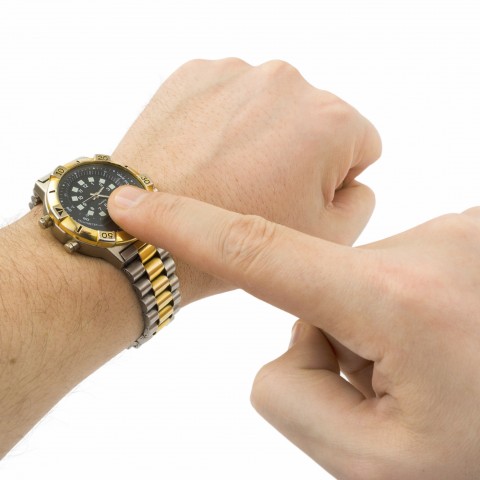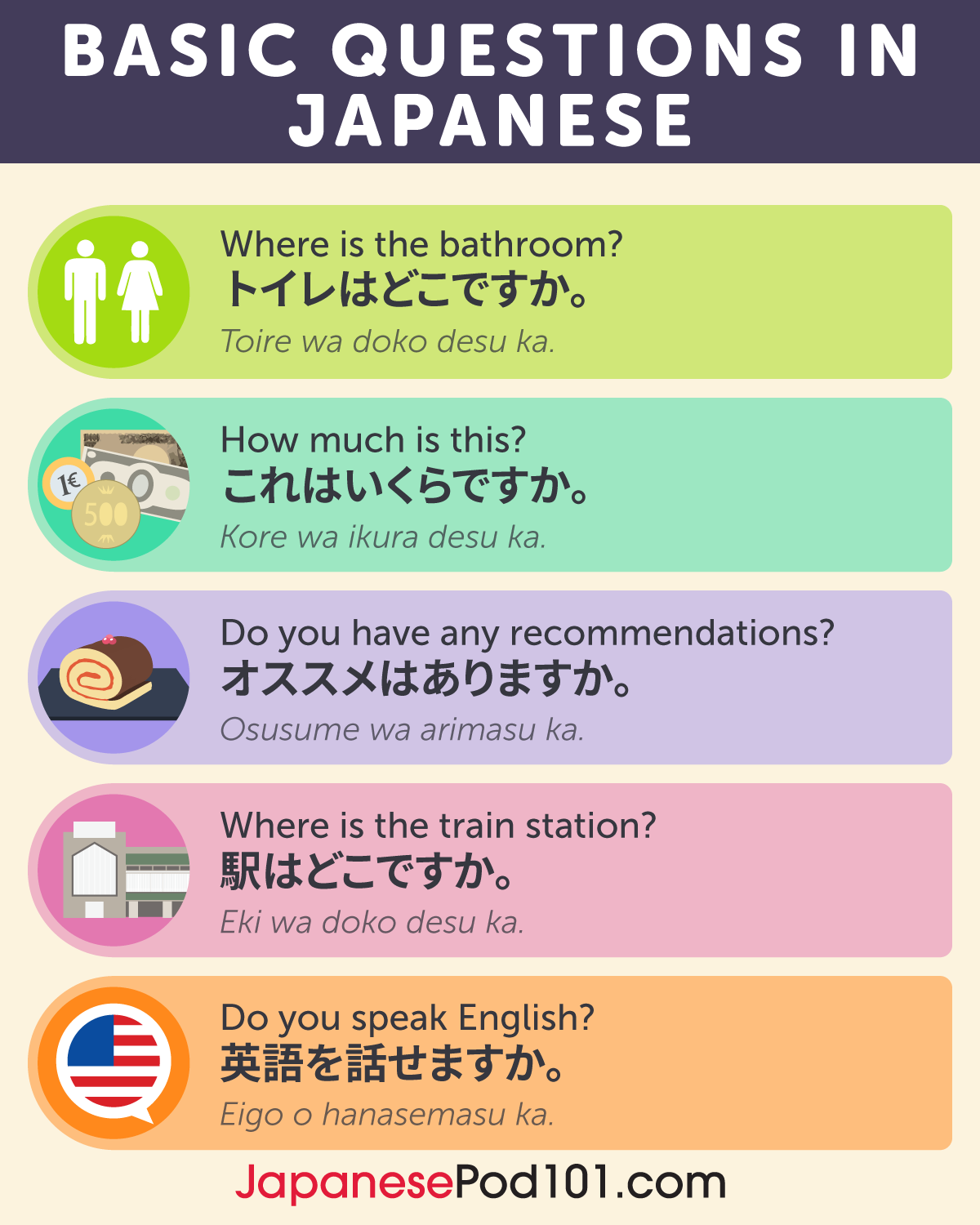
Telling time is one of the most essential aspects of everyday life. Learning how to tell time in Japanese will help you improve your basic Japanese language skills. Whether you’re checking the time for transportation or making an appointment, knowing how to say time in Japanese will help you when visiting Japan.
Telling time in Japanese is quite simple and easy to understand. Unlike in English, when expressing time in Japanese, the words which indicate the hour and minute are always added next to the numbers (e.g. 3:12 or three twelve = 時 (3ji) 分 (12fun). Thus, even without context or a sentence, you’ll easily understand that these phrases indicate time in Japanese.
In this article, we introduce the basic vocabulary and phrases for telling time in Japanese. Let’s get started!
 Table of Contents
Table of Contents
- How to Ask for the Time
- Telling Time in Japanese: Hours
- Telling Time in Japanese: Minutes
- The Hours Divided into Minutes
- General Time Reference of the Day
- Adverbs of Time in Japanese
- Time Proverbs and Sayings
- Conclusion: How JapanesePod101 Can Help You Learn More Japanese
1. How to Ask for the Time

Here’s a list of the most typical phrases for asking about time in Japanese.
1- What time is it now?
Japanese: 今何時ですか。
Reading: Ima nan-ji desu ka.
- すみません、今何時ですか。
Sumimasen, ima nan-ji desu ka.
Excuse me, what time is it now?
2- Do you know the time now?
Japanese: 今何時かわかりますか。
Reading: Ima nan-ji ka wakarimasu ka.
- ちょっといいですか、今何時かわかりますか。
Chotto ii desu ka, ima nan-ji ka wakarimasu ka.
Can I talk to you a bit? Do you know the time now?
3- What time is the [e.g. meeting]?
Japanese: [会議] は何時ですか。
Reading: [Kaigi] wa nan-ji desu ka.
- 田中さん、到着は何時ですか。
Tanaka-san, tōchaku wa nan-ji desu ka.
Mr. (Ms.) Tanaka, what time is the arrival?
4- What time do we meet up?
Japanese: 何時に集合ですか。
Reading: Nan-ji ni shūgō desu ka.
- すみません、7月10日は何時に集合ですか。
Sumimasen, shichi-gatsu tōka wa nan-ji ni shūgō desu ka.
Excuse me, what time do we meet up on July 10?
To learn dates in Japanese, please visit our Reading Dates in Japanese article.

Japanese people are famous for being on time.
2. Telling Time in Japanese: Hours
When speaking, the twelve-hour clock is more commonly used; when written, either the twelve-hour clock or the twenty-four-hour clock is used for telling time in Japanese.
When using the twelve-hour clock, add 午前 (gozen) meaning “a.m.” or 午後 (gogo) meaning “p.m.” to clarify.
1- The Twelve-Hour Clock in Japanese
Add 時 (ji), meaning “hour” or “o’clock,” after the Japanese numbers. Keep in mind that Arabic numbers are commonly used.
| English | Kanji | Hiragana | Reading |
|---|---|---|---|
| 0 o’clock | 零時 | れいじ | rei-ji |
| 1 o’clock | 一時 | いちじ | ichi-ji |
| 2 o’clock | 二時 | にじ | ni-ji |
| 3 o’clock | 三時 | さんじ | san-ji |
| 4 o’clock | 四時 | よじ | yo-ji |
| 5 o’clock | 五時 | ごじ | go-ji |
| 6 o’clock | 六時 | ろくじ | roku-ji |
| 7 o’clock | 七時 | しちじ | shichi-ji |
| 8 o’clock | 八時 | はちじ | hachi-ji |
| 9 o’clock | 九時 | くじ | ku-ji |
| 10 o’clock | 十時 | じゅうじ | jū-ji |
| 11 o’clock | 十一時 | じゅういちじ | jū ichi-ji |
| 12 o’clock | 十二時 | じゅうにじ | jū ni-ji |
Please visit our Japanese Numbers article and Numbers page on JapanesePod101 to learn how to read numbers in Japanese.
2- Examples
- 昼食の時間は午後1時です。
Chūshoku no jikan wa gogo ichi-ji desu.
Lunch time is at one o’clock p.m.
- 会議は10時からですか。
Kaigi wa jū-ji kara desu ka.
Is the meeting at ten o’clock?
- 明日の朝7時に来てください。
Ashita no asa shichi-ji ni kite kudasai.
Please come at seven o’clock tomorrow morning.

Toki wa kane nari (Time is money).
3. Telling Time in Japanese: Minutes
1- Minutes in Japanese
Unlike in English, 分 (fun) or (pun) meaning “minute” is always added after the numbers when telling minutes in Japanese.
- “Minute(s)” in Japanese is 分 and it’s pronounced either fun or pun depending on which number comes before 分.
- Minutes are usually written with Arabic numbers rather than Kanji.
| English | Kanji | Hiragana | Reading |
|---|---|---|---|
| 1 minute | 一分 | いっぷん | ippun |
| 2 minutes | 二分 | にふん | ni-fun |
| 3 minutes | 三分 | さんぷん | san-pun |
| 4 minutes | 四分 | よんふん | yon-fun |
| 5 minutes | 五分 | ごふん | go-fun |
| 6 minutes | 六分 | ろっぷん | roppun |
| 7 minutes | 七分 | ななふん | nana-fun |
| 8 minutes | 八分 | はっぷん | happun |
| 9 minutes | 九分 | きゅうふん | kyū-fun |
| 10 minutes | 十分 | じゅっぷん | juppun |
| 20 minutes | 二十分 | にじゅっぷん | ni-juppun |
| 30 minutes | 三十分 | さんじゅっぷん | san-juppun |
| 40 minutes | 四十分 | よんじゅっぷん | yon-juppun |
| 50 minutes | 五十分 | ごじゅっぷん | go-juppun |
2- Examples
- 地震は朝9時24分に起きました。
Jishin wa asa ku-ji ni-jū yon-fun ni okimashita.
The earthquake occurred at 9:24 in the morning.
- 次の電車は3時47分に来ます。
Tsugi no densha wa san-ji yon-jū nana-fun ni kimasu.
The next train comes at 3:47.
- 今の時間は午後6時18分です。
Ima no jikan wa gogo roku-ji jū happun desu.
The current time is 6:18 p.m.

It is jū-ji jū ippun (10:11) in Japanese.
4. The Hours Divided into Minutes
Telling time with minutes in Japanese is quite simple and there are no special terms or phrases to express certain groups of minutes, except for 半 (han) meaning “half.” On the other hand, English has more specific expressions, such as “quarter,” “XX past two (XX minutes after two o’clock),” and “XX to seven (XX minutes before seven o’clock).”
- To express “thirty minutes past XX o’clock” in Japanese, just add 半 (han), meaning “half,” after “number + 時 (ji).”
- There’s no particular word for “quarter” when telling time in Japanese. It‘s simply “fifteen minutes”: 15分 (jū go-fun).
- “Five past six,” or 6:05, is 6時5分 (roku-ji go-fun) in Japanese.
- “Ten to seven” is 7時10分前 (shichi-ji juppun mae) in Japanese, which literally means “Ten minutes before seven o’clock.”
Examples
- 飛行機は朝8時半に出発します。
Hikōki wa asa hachi-ji han ni shuppatsu shimasu.
The airplane departs at 8:30 in the morning.
- 明日の会議は3時15分前に来てください。
Ashita no kaigi wa san-ji jū go-fun mae ni kite kudasai.
Please come to tomorrow’s meeting fifteen minutes before three o’clock.
- 今の時間は9時10分前です。
Ima no jikan wa ku-ji juppun mae desu.
The current time is ten minutes before nine o’clock.
- あの学校は朝6時半に開きます。
Ano gakkō wa asa roku-ji han ni akimasu.
That school opens at 6:30 in the morning.
5. General Time Reference of the Day
What if you want to give a nonspecific or approximate time in Japanese? Here’s some basic vocabulary for describing time in Japanese based on the general time of day.
| English | Kanji | Hiragana | Reading |
|---|---|---|---|
| AM | 午前 | ごぜん | gozen |
| PM | 午後 | ごご | gogo |
| morning | 朝 | あさ | asa |
| early morning | 早朝 | そうちょう | sōchō |
| sunrise | 日の出 | ひので | hinode |
| noon | 正午 | しょうご | shōgo |
| midday | 日中 | にっちゅう | nicchū |
| early evening | 夕方 | ゆうがた | yūgata |
| sunset | 日没 | にちぼつ | nichibotsu |
| evening / night | 夜 | よる | yoru |
| midnight | 深夜 | しんや | shin’ya |

The sunset time in summer is around seven o’clock p.m. in Japan.
Examples
- 夏の日の出は早朝の4時半です。
Natsu no hinode wa sōchō no yo-ji han desu.
The sunrise in summer is at 4:30 in the early morning.
- 明日の夜8時に夕食を食べましょう。
Ashita no yoru hachi-ji ni yūshoku o tabemashō.
Let’s have dinner at eight o’clock tomorrow evening.
- 私の飛行機は深夜12時3分に出発します。
Watashi no hikōki wa shin’ya jū ni-ji san-pun ni shuppatsu shimasu.
My flight departs at 12:03, at midnight.
- 私は今日正午から夕方まで忙しいです。
Watashi wa kyō shōgo kara yūgata made isogashii desu.
I’m busy from noon to early evening today.
6. Adverbs of Time in Japanese

You can create more-detailed and specific time-related expression by using time adverbs. Japanese adverbs of time include:
| English | Kanji | Hiragana | Reading |
|---|---|---|---|
| right now | 今すぐ | いますぐ | ima sugu |
| before | 前 | まえ | mae |
| after | 後 | あと/ご | ato/go |
| soon | ー | もうすぐ | mō sugu |
| soon | ー | ほとんど | hotondo |
| around | 頃 | ころ/ごろ | koro/goro |
| about | 約 | やく | yaku |
| currently | 現在 | げんざい | genzai |
| meanwhile | その間に | そのあいだに | sono aida ni |
| at the same time | 同時に | どうじに | dōji ni |
| at the same time | ー | いつでも | itsu demo |
| as soon as possible | 出来るだけ早く | できるだけはやく | dekirudake hayaku |
| in a while | 間もなく/しばらく | まもなく/しばらく | mamonaku/shibaraku |
| for a long time | 長い間 | ながいあいだ | nagai aida |
Examples
- 今すぐ来きてください。会議は15分後に始まります。
Ima sugu kite kudasai. Kaigi wa jū go-fun go ni hajimarimasu.
Please come right now. The meeting is starting after fifteen minutes.
- 同時に、別のパーティーが午後7時半から始まります。
Dōji ni, betsu no pātī ga gogo shichi-ji han kara hajimarimasu.
At the same time, another party will start at 7:30 p.m.
- 私は午前8時から長い間待っています。出来るだけ早くここへ来てください。
Watashi wa gozen hachi-ji kara nagai aida matte imasu. Dekirudake hayaku koko e kite kudasai.
I have been waiting for a long time, since 8 o’clock a.m. Come here as soon as possible.
- 今は午後2時58分で、もうすぐ3時になります。まもなく電車が来ます。
Ima wa gogo ni-ji go-jū happun de, mō sugu san-ji ni narimasu. Mamonaku densha ga kimasu.
It is 2:58 p.m. and it’s going to be 3:00 soon. The train comes in a while.

Japanese trains are very punctual.
7. Time Proverbs and Sayings
When talking about time in Japanese culture, there are many ことわざ (kotowaza) and 慣用句 (kan’yōku), or “proverbs” and “sayings” regarding time in Japanese. Here are some of the most famous proverbs.
- Time is money.
Japanese: 時は金なり
Reading: Toki wa kane nari
Meaning: It literally translates to “time is money,” and it means that time is as precious as money.
遅れないように! 「時は金なり」ですよ。
Okurenai yō ni! “Toki wa kane nari” desu yo.
Don’t be late! Time is money.
- Time flies.
Japanese: 光陰矢のごとし
Reading: Kōin ya no gotoshi
Meaning: It literally translates to “time is like an arrow,” meaning that time flies fast, like an arrow. The word 光陰 (Kōin) comes from 漢文 (Kanbun), an old Chinese word which denotes “light and shade,” meaning “time.” Thus, time goes by with days and nights.
前回会った時から既に5年経ちました。「光陰矢のごとし」ですね。
Zenkai atta toki kara sude ni go-nen tachimashita. “Kōin ya no gotoshi” desu ne.
Five years have already passed since we last met. Time flies, doesn’t it?
- Time and tide wait for no man.
Japanese: 歳月人を待たず
Reading: Saigetsu hito o matazu
Meaning: It literally translates to “years and months do not wait for man,” meaning that time goes by constantly without heeding one’s circumstances. It indicates that people shouldn’t waste time and should instead make each day count.
やるべき事ややりたい事は今すぐやりましょう。「歳月人を待たず」ですよ!
Yarubeki koto ya yaritai koto wa ima sugu yarimashō. ”Saigetsu hito o matazu” desu yo!
Do right now what you should do and what you want to do. It’s “time and tide wait for no man!”
- Each day is like a thousand years.
Japanese: 一日千秋
Reading: Ichijitsu senshū
Meaning: It literally translates to “one day is like a thousand autumns.” It means that one can hardly wait for something because it feels very far in the future, as if one day is like a thousand years (autumn comes a thousand times). 秋 (aki/shū) means “autumn,” but it also can mean “time” as a metaphor. It’s said that autumn is the time for harvest, and ancient people realized that a year had passed when autumn came.
彼女は来月行く予定のコンサートを一日千秋の思いで待っています。
Kanojo wa raigetsu iku yotei no konsāto o ichijitsu senshū no omoi de matte imasu.
She’s waiting for the concert she’s going to next month with the feeling that each day is like a thousand years.
8. Conclusion: How JapanesePod101 Can Help You Learn More Japanese

In this article, we introduced how to tell time in Japanese, including the basic vocabulary and phrases, such as the different units of time in Japanese. Now you can ask for the time and tell time in Japanese whenever you make an appointment or check times for your travels.
I hope you’ll enjoy meeting friends and getting around in Japan; make sure you’re on time when meeting them!
Are there any time-related words in Japanese you still want to know? Let us know in the comments!
If you would like to learn more about the Japanese language and other useful Japanese phrases, you’ll find a lot of helpful content on JapanesePod101.com. We provide a variety of free lessons for you to improve your Japanese language skills. Here’s some more information about numbers and time in Japanese with audio: Talking about Time, Numbers, and Kanji for Numbers and Counters.
To learn how to make conversation in Japanese, check out Top 15 Questions You Should Know for Conversations and Top 10 Conversational Phrases. Phrases You Need at the Bus or Train Station and Trains are also useful if you plan on getting around Japan with public transportation.
There’s so much more! Be a fast learner and enjoy studying Japanese at JapanesePod101.com!










